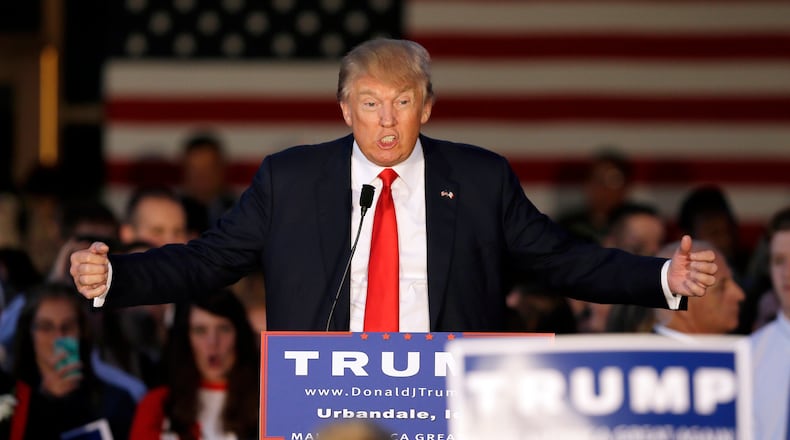If there is one thing that unites pro-immigration Democrats and immigration-restrictionist Republicans, it's the belief that Donald Trump's popularity with GOP voters is all about immigration.
Both sides, of course, have an incentive to make such a claim: Both of them want you to believe it's true. Those on the right, because they want other Republicans to adopt their position; those on the left, because they want you to believe all Republicans are anti-immigrant xenophobes.
The problem is that there's scant evidence for believing Trump's popularity is directly tied to his positions on immigration. I alluded to as much in this morning's post about Scott Walker . This afternoon at RedState, Leon Wolf offers a much more thorough explanation of why immigration doesn't explain Trump's success:
"Additionally, the explanation that immigration is the one issue that Trump voters care about is flatly inconsistent with the actual polling data that demonstrates his rise to the top. If you look at the RCP averages since Trump entered the race , it is clear that he has pulled the bulk of his support from Jeb Bush and Scott Walker. It beggars the imagination to think that, here were all these Republican voters who cared nothing about anything other than immigration, but before Donald Trump came along, they were going to support the two most moderate candidates in the race on immigration. Further, if you look at Trump's recent dip in the polls, it is clear that the voters who have left his ship have gone to (Marco) Rubio and (Carly) Fiorina, neither of whom is an immigration hard liner by any stretch of the imagination.
"If immigration were the end-all-be-all in this year's election, then before Donald Trump entered the race, Sen. Ted Cruz should have been way out in front, as he was clearly the most doctrinaire immigration candidate in the race -- but he wasn't. Further, if all The Donald's supporters care about is immigration, then to the extent that they leave Trump's camp, it should be to another immigration hard liner like Cruz or (Rick) Santorum or someone. But they're not. In fact, the stubborn resistance of Cruz's polling numbers to respond either positively or negatively to changes in Trump's fortunes is nearly conclusive evidence that immigration is not the primary driver of Trump's support." (links original)
So what does account for Trump's rise? Wolf theorizes that it's "a reflection of the frustration people have in being told to act like adults."
"I think we've become a nation full of people who are painfully repressed and that there's a significant part of the population that is sick to death of it. I think that's why people behave the way they do online. The things people will say through their phones and through email are things you never hear people say real life, and I think that is reflective of the fact people are dying for an outlet to just achieve catharsis sometimes and just let it all out -- and Donald Trump is just a personification of that." (emphasis original)
This is essentially the anti-political correctness explanation. And certainly, much of Trump's behavior and language -- including his defense of his disparaging remarks about women when questioned about them by Megyn Kelly during the first GOP debate, as well as his defense of his attacks on Kelly and Fiorina since then -- suggests he thinks that's what is driving his success, too.
I'd add something that might be called a corollary to this "adults" theory since it hinges on that same word. People are tired of being told "let the adults handle things" or leave it to "the adults in the room."
This phrase is used by partisans of both sides, and it's intentionally condescending: If one side represents "the adults," the other must be the petty, sophomoric, ignorant, selfish, unsophisticated children. You see it often enough on this blog's comment threads. Certainly, we have heard a lot of this condescending phrase during the Obama administration; there's even a tag for "the adults in the room" on Daily Kos.
It's not just a partisan thing. Implicit in the use of this phrase, by both sides, is that "the adults" have to set things right and that the place for them to do that is in some level of government. The only place we can find "the adults," then, is in government -- which again implies that everyone outside the government are "the children." Consider it one more way the governing class reiterates the need to coddle an infantilized population.
Here's the irony: "The adults," given their track record, actually stink at "handling things." It's "the adults," after all, who have driven up the national debt, made a bloody hash of our foreign policy, constrained the economy to the point 2.5 percent growth is seen as an uptick, ground things to a halt on Capitol Hill and generally driven Americans to believing the country is perpetually on the wrong track .
I think all of that is helping to drive the Trump phenomenon. Do I think his is a fundamentally unserious, demagogic campaign? Yes. Do I understand why people look at the supposedly serious candidates who have been in elected office before and wonder why they should be trusted to do better than they have the past decade and a half -- or better than Trump? Also yes.
Now, do I think they're right? No, I don't. Just because Washington has been on the wrong track for a long time doesn't mean we need a reality TV star to set things right. On the contrary, we need someone who has a little more humility about what Washington generally, and the president specifically, ought to be doing -- and a little more trust in the tens of millions of real adults who do the things that make this country, even after all the "adults" have done to it, a great one.
About the Author
The Latest
Featured



